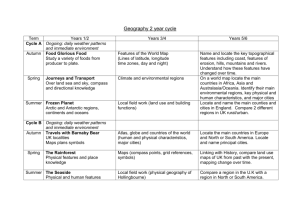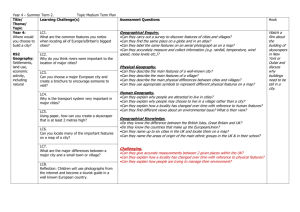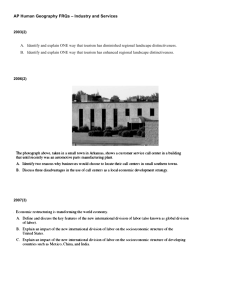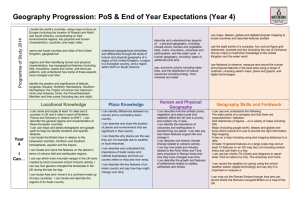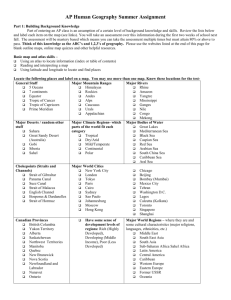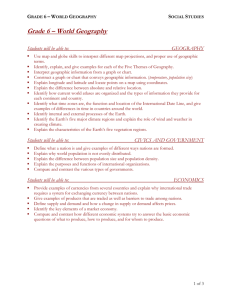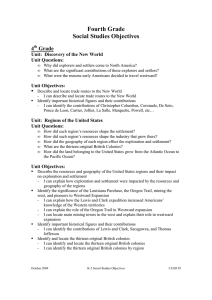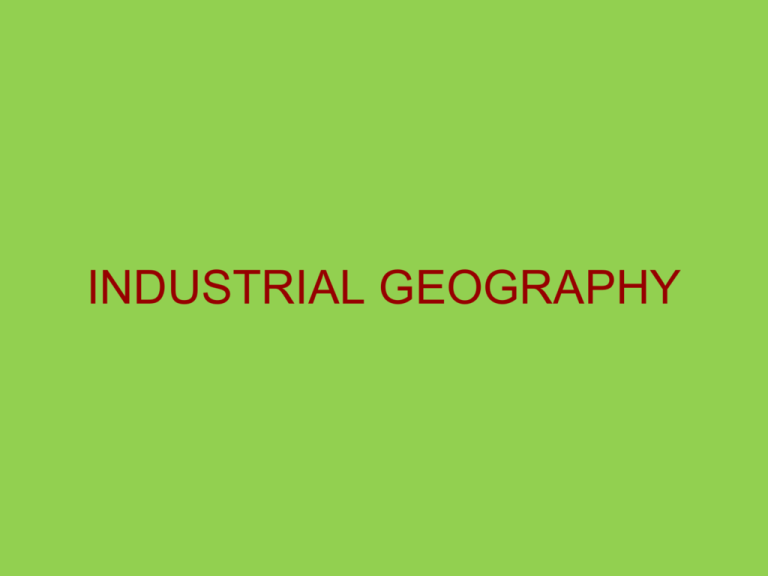
INDUSTRIAL GEOGRAPHY
The Industrial Revolution
• Growing European domestic markets & a
lacking labor force
• Increased transportation and
communications
• Steam-power for ocean-going vessels
Situation Factors
• If the cost of transporting the product
exceeds the cost of transporting inputs,
then the optimal plant location is as close
as possible to the customer.
• If the inputs are more expensive to
transport, then locate near these.
LOCATE NEAR THE INPUTS
OR
LOCATE NEAR THE CUSTOMER(MARKET)
BULK-REDUCING
INDUSTRIES
• Must be located
near the original
large input sources
(COPPER)
• Iron-Ore and coal
(to make steel)
Go where they
are mined
Location Near Markets:
1. BULK-GAINING
INDUSTRIES
• Gains volume or weight
during production
• Soft Drinks: 2 inputs syrup
and water, bulky, heavy to
transport, ships syrup to
bottlers, WATER IS
EVERYWHERE, produce
near customers
Types of industries
• 2. Perishable Products:
milk, fresh fruit,
newspapers (hard copy)
• 3. Single-market
manufacturers: products
sold in 1 location near
your market
New York Fashions
Car part plants are located
near assembly plants
Transportation
• Ship, rail, truck, or air:
choose the cheapest one
according to weight, how far
it is being shipped
• Trucks=short distance
• Trains=long distance
• Small bulk, high value=air
freight
Break of Bulk Point=intermodal:
locate where can transfer
among many transportation
modes
Site Factors: Land, Labor,
capital
• Land-factories are usually rural or
suburban, need large tracts of land to build
1 story (more energy efficient and
cheaper)
• Low-electrical rates
• Amenities, mild climate, opportunities for
outdoor recreation, usually south or west
• Cultural centers or sports franchises,
whatever the owner’s interests are
Labor: intensive industry is one in which labor is a
high percentage of the expense.
• -highly skilled to increase the
profits
• Less-skilled, inexpensive labor,
Indonesia
• (in Southeast U.S.)
• Textiles and clothing: spin fibers
to make yarn, weave or knit yarn
into fabric, bleach, dye, cutting,
sewing into clothing or other
products
Usually located in plants where the
input of cotton is grown, China,
India, Pakistan, Uzbekistan,
U.S.
Cotton Production
Capital: manufacturers borrow money to establish
new factories or expand one
• -vehicle industry moved to Michigan
because banks made loans
• -Silicon Valley-skilled labor and banks
willing to invest in new ideas ¼ of all
capital in U.S. spent on new industries
here
LDCs: distribution of industry
must seek loans from MDCs:
• Difficult to do…..WHY?
• 1. unstable political system
• 2. high debt level
• 3. ill-advised economic policies
Local and city gov’t provide incentives to locate
industries there
• 1. grants
• 2. low-cost loans
• 3. tax breaks
http://projects.flowingdata.com/walmart/
Footloose industries
• Can locate anywhere, owners can choose
an inferior place to maximize profits
-pick a place to ensure survival of the firm
-small firm, may pick for personal reasons
The Location Decision
Weber's model: the “least cost theory”
– Minimization of three critical expenses
1. Transportation costs
2. Labor costs
3. Agglomeration
Resources
•
•
•
•
•
•
De Blij, Harm, J. (2007). Human Geography People, Place and Culture. Hoboken,
NJ: John Wiley & Sons Inc.
Domosh, Mona, Neumann, Roderic, Price, Patricia, & Jordan-Bychkov, 2010. The
Human Mosaic, A Cultural Approach to Human Geography. New York: W.H.
Freeman and Company.
Fellman, Jerome, D., Getis, Arthur, & Getis, Judith, 2008. Human Geography,
Landscapes of Human Activities. Boston, MA: McGraw-Hill Higher Education.
Pulsipher, Lydia Mihelic and Alex M. and Pulsipher, 2008. World Regional
Geography, Global Patterns, Local Lives. W.H. Freeman and Company New
York.
Rubenstein, James M. (2008). An introduction to human geography The cultural
landscape. Upper Saddle River, NJ: Pearson Prentice Hall.
Benewick, Robert, & Donald, Stephanie H. (2005). The State of
China Atlas. Berkeley: University of California Press.

